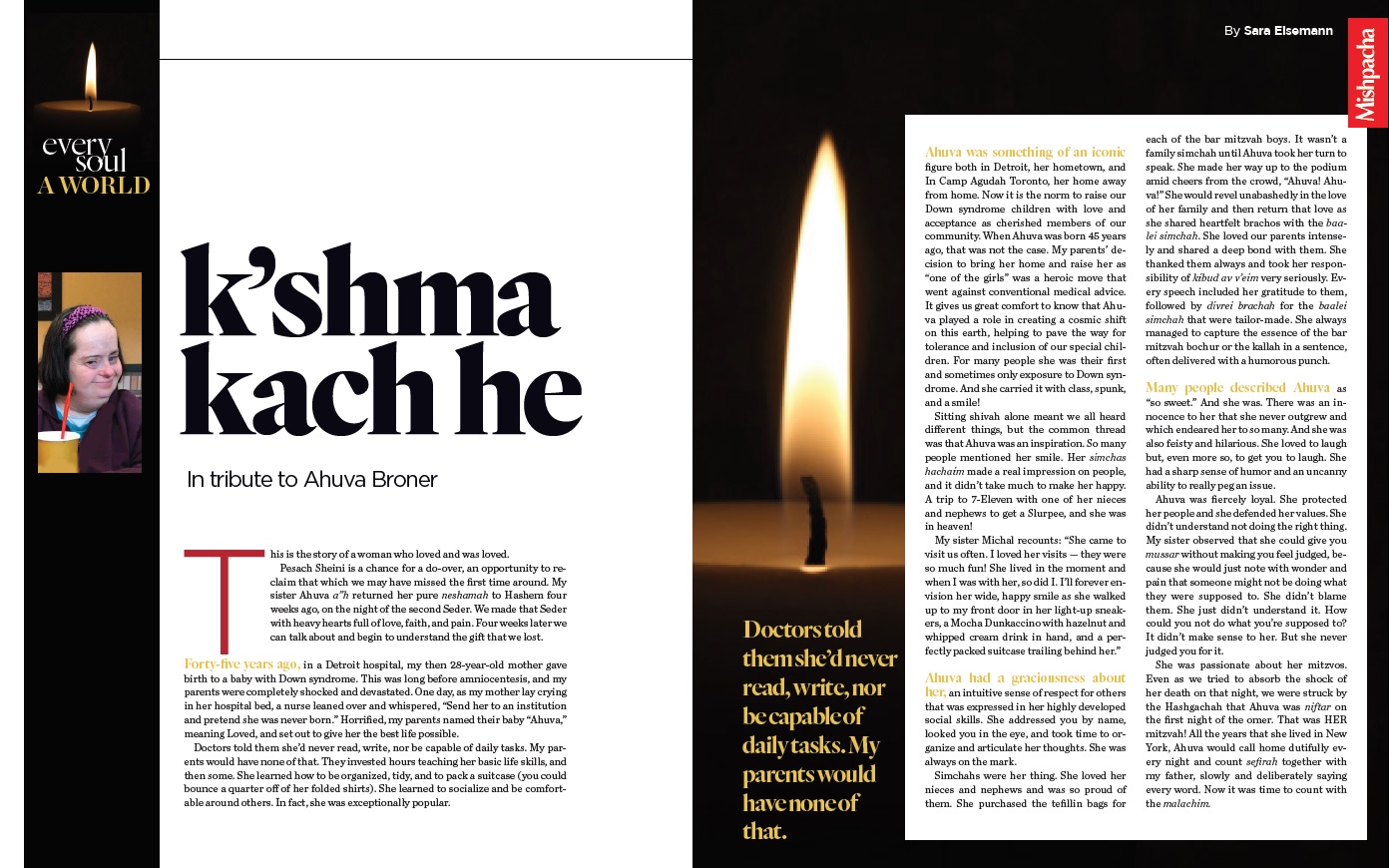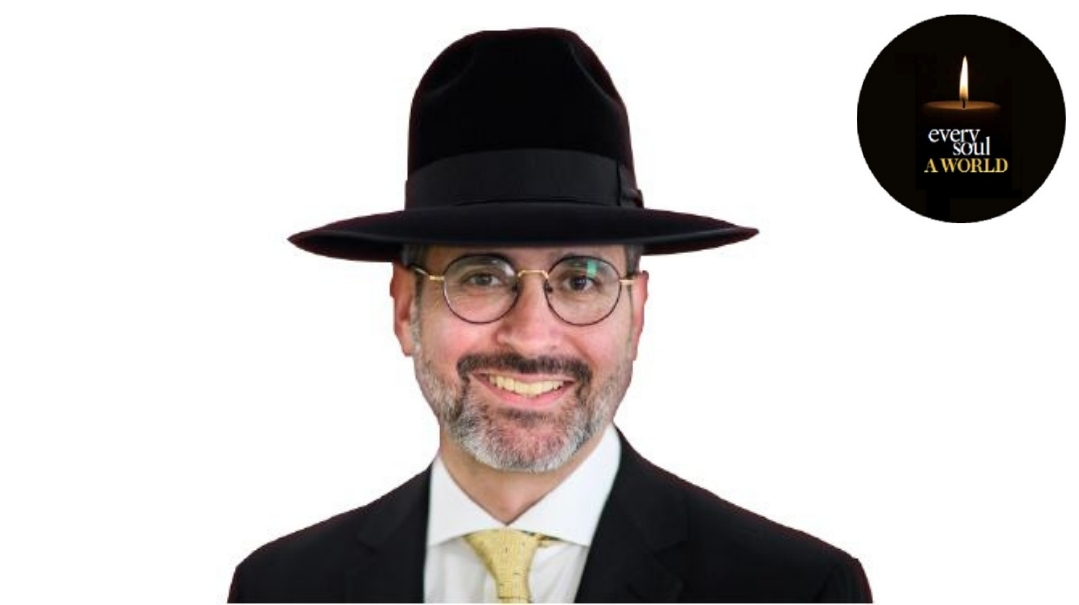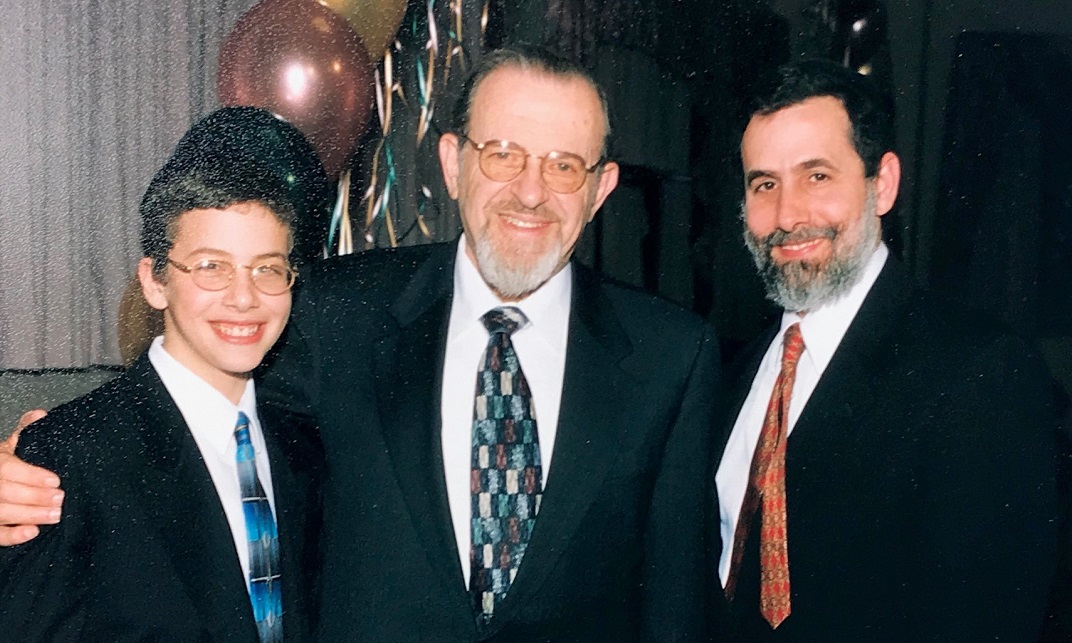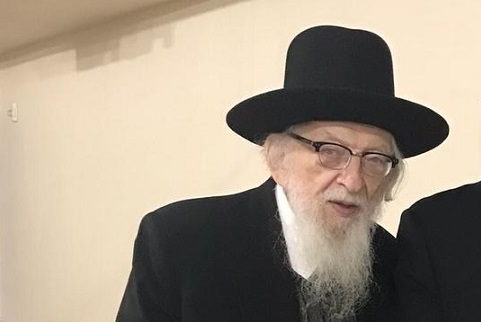Ahuva Broner
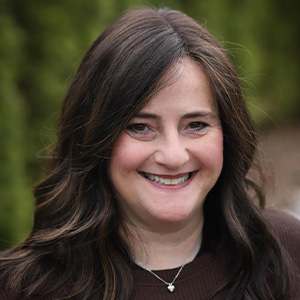
She was ahead of her time in her ability to intuit what has taken us so long to understand: life is complex, but it doesn’t have to be complicated.
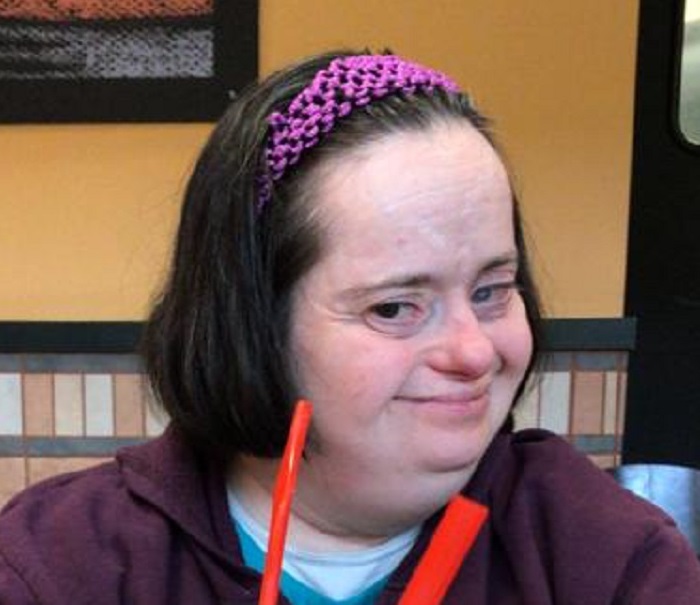
May 8, 2020 / Pesach Sheini, 14 Iyar, 5780
A

huva — k’shma kach he.
This is the story of a woman who loved and was loved.
Pesach Sheini is a chance for a do-over, an opportunity to reclaim that which we may have missed the first time around. My sister Ahuva a"h returned her pure neshamah to Hashem four weeks ago, on the night of the second Seder. We made that Seder with heavy hearts full of love, faith, and pain. Four weeks later we can talk about and begin to understand the gift that we lost.
Forty-five years ago, in a Detroit hospital, my then 28-year-old mother gave birth to a baby with Down syndrome. This was long before amniocentesis, and my parents were completely shocked and devastated. One day, as my mother lay crying in her hospital bed, a nurse leaned over and whispered, “Send her to an institution and pretend she was never born.” Horrified, my parents named their baby “Ahuva,” meaning Loved, and set out to give her the best life possible.
Doctors told them she’d never read, write, nor be capable of daily tasks. My parents would have none of that. They invested hours teaching her basic life skills, and then some. She learned how to be organized, tidy, and to pack a suitcase (you could bounce a quarter off of her folded shirts). She learned to socialize and be comfortable around others. In fact, she was exceptionally popular.
Ahuva was something of an iconic figure both in Detroit, her hometown, and in Camp Agudah Toronto, her home away from home. Now it is the norm to raise our Down syndrome children with love and acceptance as cherished members of our community. When Ahuva was born 45 years ago, that was not the case. My parents’ decision to bring her home and raise her as “one of the girls” was a heroic move that went against conventional medical advice. It gives us great comfort to know that Ahuva played a role in creating a cosmic shift on this earth, helping to pave the way for tolerance and inclusion of our special children. For many people she was their first and sometimes only exposure to Down syndrome. And she carried it with class, spunk, and a smile!
Sitting shivah alone meant we all heard different things, but the common thread was that Ahuva was an inspiration. So many people mentioned her smile. Her simchas hachaim made a real impression on people, and it didn’t take much to make her happy. A trip to 7-Eleven with one of her nieces and nephews to get a Slurpee, and she was in heaven!
My sister Michal recounts: "She came to visit us often. I loved her visits — they were so much fun! She lived in the moment and when I was with her, so did I. I’ll forever envision her wide, happy smile as she walked up to my front door in her light-up sneakers, a Mocha Dunkaccino with hazelnut and whipped cream drink in hand, and a perfectly packed suitcase trailing behind her."
Ahuva had a graciousness about her, an intuitive sense of respect for others that was expressed in her highly developed social skills. She addressed you by name, looked you in the eye, and took time to organize and articulate her thoughts. She was always on the mark.
Simchahs were her thing. She loved her nieces and nephews and was so proud of them. She purchased the tefillin bags for each of the bar mitzvah boys. It wasn’t a family simchah until Ahuva took her turn to speak. She made her way up to the podium amid cheers from the crowd, “Ahuva! Ahuva!” She would revel unabashedly in the love of her family and then return that love as she shared heartfelt brachos with the baalei simchah. She loved our parents intensely and shared a deep bond with them. She thanked them always and took her responsibility of kibud av v’eim very seriously. Every speech included her gratitude to them, followed by divrei brachah for the baalei simchah that were tailor-made. She always managed to capture the essence of the bar mitzvah bochur or the kallah in a sentence, often delivered with a humorous punch.
Many people described Ahuva as “so sweet.” And she was. There was an innocence to her that she never outgrew and which endeared her to so many. And she was also feisty and hilarious. She loved to laugh but, even more so, to get you to laugh. She had a sharp sense of humor and an uncanny ability to really peg an issue.
Ahuva was fiercely loyal. She protected her people and she defended her values. She didn’t understand not doing the right thing. My sister observed that she could give you mussar without making you feel judged, because she would just note with wonder and pain that someone might not be doing what they were supposed to. She didn’t blame them. She just didn’t understand it. How could you not do what you’re supposed to? It didn’t make sense to her. But she never judged you for it.
She was passionate about her mitzvos. Even as we tried to absorb the shock of her death on that night, we were struck by the Hashgachah that Ahuva was niftar on the first night of the omer. That was HER mitzvah! All the years that she lived in New York, Ahuva would call home dutifully every night and count sefirah together with my father, slowly and deliberately saying every word. Now it was time to count with the malachim.
Ahuva had an incredible capacity for acceptance. She never asked us to be anything more or less than who we were. Even as we always pushed her for more, to be as “normal” as possible, she never demanded anything in return. She loved us for who we were, and I believe that is why she was so loved. Old Agudah girls will remember the dining room booming with the declaration, “Ahuva means love, and we love Ahuva.” Camp afforded her the opportunity to express her inner soul and creativity and she would go on stage with full confidence and perform dances and songs for the entire camp. No inhibition, just pure presence and expression of her heart.
Ahuva lived a full and happy life, with plenty of friends, and a list of accomplishments. She stayed quite busy in the group home where she lived, in New York. She was in Drama Club, loved to dance and sing, and knew how to read, write, and text. She excelled in baking and arts and crafts. She often played the lead in the yearly play put on by HASC.
In that vein, Ahuva was endlessly patient and grounded. Whatever she was engaged in, she was fully present. She could color for hours on end, spend hours packing her suitcase just so, enjoy a meal at a leisurely pace, and just sit on the couch and enjoy the people around her. You never felt like she was running somewhere else, like there was someplace else she’d rather be. She was mindful long before it was in vogue.
And she was ahead of her time in her ability to intuit what has taken us so long to understand: life is complex, but it doesn’t have to be complicated. When she moved to her HASC home 19 years ago, we were so conflicted. We knew it was the right decision, but everything about it was so hard. When I called her later that week to check on her, I was so conflicted that I just started babbling. “Ahuva, do you like New York or do you miss home?” To which she simply answered, “Both.”
She taught us that life is sometimes messy and that’s okay. We don’t always have to figure it all out. We can live in the both and grow from both.
It was a lesson I thought I had internalized but it seems Ahuva was a teacher to the end. I spoke to her the day she was admitted to the hospital and I assumed she must be terrified. In my desperation to fix it, to try and comfort her, I asked, “Ahuva, are you very scared or are you okay?”
And wouldn’t you know it? She simply answered, “Both.”
So, Ahuva, we know that you are in Shamayim, close to Hashem and are very happy there. And that you also miss us. We are so happy for you that you are enjoying the rewards of the impact you made on this earth. And we miss you very much. Both.
VIEW/DOWNLOAD PDF VERSION
My first encounter with Ahuva was at United Hebrew School for students with special needs. My son Yudie was in the same class and was also the same age. We carpooled together. Ahuva was always so friendly and well mannered. So would always ask how we were feeling and she was always B'H fine. When my oldest daughter got married the Broners hosted some of our guests over Shabbos. I remember them telling me how personable and helpful she was. She showed them to their room and asked if she could get them something or if they needed anything. They were really impressed by her.
When Yudie moved to NY so did Ahuva. Whenever she came back to Oak Park and we would run into her, she would always ask me how Yudie was and how I was feeling. She always answered with B'H. I was so impressed with her faith in Hashem and her wonderful memory.
She was so independent, and while she seemed to always be growing, unfortunately my son went the other way. He was very ill about 10 years ago and since then he can't travel and come to visit here. He has lost a lot of skills and has trouble walking. Yudie was also in the hospital with corona about 10 days before Pesach. We were so worried about him. We couldn't speak to him or go into NY to see him. He has deteriorated so much we were really worried. But B'H a day before Peasch he was able to go back to his home.
When I heard about Ahuva during chol hamoed, I couldn't believe it. We had just seen her in Shul with her mother over Rosh Hashana, and she looked so happy and was dressed beautifully for Yom tov. She greeted me and wished me a good year. I was so touched, she hadn't changed she was so polite and personable. I can't say that about Yudie, he's lost so much of his social skills. Ahuva hadn't changed a bit, she was the same sweet girl she always was. May her neshama have the highest Aliyah, I sure she is looking down from shamayim and smiling that beautiful smile she always had. May her memory be for a blessing.
—Chaya Youngworth
Oops! We could not locate your form.

